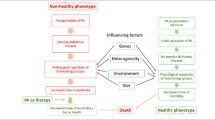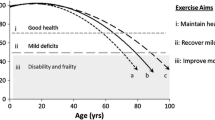Abstract
Background
The potential of the effect of balance training on improving cognitive functions and functional activities in vulnerable groups, including the older adults with heart failure (HF), is unknown.
Aim
The aim of the present study was to determine the effect of a simple balance training supervised by nurses on cognitive functions and activities of daily living (ADLs) of the older adults with HF.
Methods
In this clinical trial study, 75 older adults with HF were allocated to two groups of balance training (BT) and usual care (UC) using stratified block randomization. The intervention consisted of a set of dynamic and static BT, 4 times/session per week, each session lasting 30 min, for 8 weeks, which was performed at the participant’s home under the supervision of a nurse. For the control group, UC was provided. The outcomes of the study, including cognitive function, basic ADLs, and instrumental ADLs (IADLs), were measured by the Montreal cognitive assessment-basic (MoCA-B), Barthel index-ADL, and Lawton scale-IADL before and after the intervention.
Results
The between-group analysis showed, in two groups, a statistically significant difference between the changes in the mean scores: all subscales of cognitive function and MoCA-B total score (P < 0.001), as well as basic ADLs and IADLs (P < 0.001), before and after the intervention. Compared with the control group/UC, the cognitive function, basic ADL, and IADL of the intervention group/BT were improved significantly at 8 weeks.
Conclusion
The results suggested that home-based balance training led by nurse can improve global cognitive function and basic ADL and IADL in the older adults with HF.
Trial registration
Clinical trials registration number IRCT20150919024080N18.

Similar content being viewed by others
Data availability
The data sets generated during and/or analyzed during the current study are available from the corresponding author on reasonable request.
References
Van Nguyen T, Dang HT, Burns MJ et al (2021) Impairment in activities of daily living and readmission in older patients with heart failure: a cohort study. BMJ Open 11(2):e044416
Takabayashi K, Kitaguchi S, Iwatsu K et al (2019) A decline in activities of daily living due to acute heart failure is an independent risk factor of hospitalization for heart failure and mortality. J Cardiol 73(6):522–529
Vidán MT, Martín Sánchez FJ, Sánchez E et al (2019) Most elderly patients hospitalized for heart failure lack the abilities needed to perform the tasks required for self-care: impact on outcomes. Eur J Heart Fail 21(11):1434–1442
Saito H, Yamashita M, Endo Y et al (2020) Cognitive impairment measured by Mini-Cog provides additive prognostic information in elderly patients with heart failure. J Cardiol 76(4):350–356
Gary RA, Paul S, Corwin E et al (2019) Exercise and cognitive training as a strategy to improve neurocognitive outcomes in heart failure: a pilot study. Am J Geriatr Psychiatry 27(8):809–819
Zuo W, Wu J (2022) The interaction and pathogenesis between cognitive impairment and common cardiovascular diseases in the elderly. Ther Adv Chronic Dis 13:20406223211063020
Kua ZJ, Valenzuela M, Dong Y (2019) Can computerized cognitive training improve cognition in patients with heart failure?: A review. J Cardiovasc Nurs 34(2):E19–E27
Kraiwong R, Vongsirinavarat M, Rueankam M, Sumalrot T (2021) Effects of physical-cognitive training on physical and psychological functions among older adults with type 2 diabetes and balance impairment: a randomized controlled trial. J Exerc Rehabil 17(2):120
Kewcharoen J, Trongtorsak A, Kanitsoraphan C et al (2019) Cognitive impairment and 30-day rehospitalization rate in patients with acute heart failure: a systematic review and meta-analysis. Indian Heart J 71(1):52–59
McDougall GJ, Han A, Staggs VS et al (2019) Predictors of instrumental activities of daily living in community-dwelling older adults. Arch Psychiatr Nurs 33(5):43–50
Obata H, Izumi T, Yamashita M et al (2021) Characteristics of elderly patients with heart failure and impact on activities of daily living: a registry report from super-aged society. J Cardiac Fail 27(11):1203–1213
Feng Z, Li Q, Zhou L et al (2021) The relationship between depressive symptoms and activity of daily living disability among the elderly: results from the China Health and Retirement Longitudinal Study (CHARLS). Public Health 198:75–81
Hashimoto K, Hirashiki A, Ozaki K et al (2022) Benefits of a balance exercise assist robot in the cardiac rehabilitation of older adults with cardiovascular disease: a preliminary study. J Cardiovasc Dev Dis 9(6):191
Hickman L, Ferguson C, Davidson PM et al (2020) Key elements of interventions for heart failure patients with mild cognitive impairment or dementia: a systematic review. Eur J Cardiovasc Nurs 19(1):8–19
Sok S, Shin E, Kim S, Kim M (2021) Effects of cognitive/exercise dual-task program on the cognitive function, health status, depression, and life satisfaction of the elderly living in the community. Int J Environ Res Public Health 18(15):7848
Noh H-J, Lee S-H, Bang D-H (2019) Three-dimensional balance training using visual feedback on balance and walking ability in subacute stroke patients: a single-blinded randomized controlled pilot trial. J Stroke Cerebrovasc Dis 28(4):994–1000
Domínguez-Navarro F, Igual-Camacho C, Silvestre-Muñoz A et al (2018) Effects of balance and proprioceptive training on total hip and knee replacement rehabilitation: a systematic review and meta-analysis. Gait Posture 62:68–74
Dunsky A (2019) The effect of balance and coordination exercises on quality of life in older adults: a mini-review. Front Aging Neurosci 11:318
Rogge A-K, Röder B, Zech A, Hötting K (2018) Exercise-induced neuroplasticity: balance training increases cortical thickness in visual and vestibular cortical regions. Neuroimage 179:471–479
Rogge A-K, Röder B, Zech A et al (2017) Balance training improves memory and spatial cognition in healthy adults. Sci Rep 7(1):5661
Conradsson D, Halvarsson A (2019) The effects of dual-task balance training on gait in older women with osteoporosis: a randomized controlled trial. Gait Posture 68:562–568
Burton E, Hill K, Ellis KA et al (2022) Balance on the brain: a randomised controlled trial evaluating the effect of a multimodal exercise programme on physical performance, falls, quality of life and cognition for people with mild cognitive impairment—study protocol. BMJ Open 12(4):e054725
Hollenberg SM, Lindenfeld J, Masoudi FA et al (2016) 2016 ACC/AHA/HFSA focused update on new pharmacological therapy for heart failure: an update of the 2013 ACCF/AHA guideline for the management of heart failure. J Card Fail 22(9)
Aartolahti E, Lönnroos E, Hartikainen S, Häkkinen A (2020) Long-term strength and balance training in prevention of decline in muscle strength and mobility in older adults. Aging Clin Exp Res 32:59–66
Sörlén N, Hult A, Nordström P et al (2021) Short-term balance training and acute effects on postural sway in balance-deficient older adults: a randomized controlled trial. BMC Sports Sci Med Rehabil 13(1):1–9
Thiamwong L, Suwanno J (2014) Effects of simple balance training on balance performance and fear of falling in rural older adults. Int J Gerontol 8(3):143–146
Julayanont P, Tangwongchai S, Hemrungrojn S et al (2015) The Montreal cognitive assessment—basic: a screening tool for mild cognitive impairment in illiterate and low-educated elderly adults. J Am Geriatr Soc 63(12):2550–2554
Rashedi V, Foroughan M, Chehrehnegar N (2021) Psychometric properties of the Persian Montreal Cognitive Assessment in mild cognitive impairment and Alzheimer disease. Dement Geriatr Cogn Disord Extra 11(1):51–57
Graf C (2008) The Lawton instrumental activities of daily living scale. AJN Am J Nurs 108(4):52–62
Alosco ML, Brickman AM, Spitznagel MB et al (2016) Smaller brain volume is associated with poorer instrumental ADL performance in heart failure. J Cardiovasc Nurs 31(1):31
Hormozi S, Alizadeh-Khoei M, Sharifi F et al (2019) Iranian version of barthel index: validity and reliability in outpatients’ elderly. Int J Prev Med
Albanese AM, Bartz-Overman C, Parikh T, Thielke SM (2020) Associations between activities of daily living independence and mental health status among medicare managed care patients. J Am Geriatr Soc 68(6):1301–1306
Palmgren A, Ståhle A, Skavberg Roaldsen K et al (2020) “Stay balanced”–effectiveness of evidence-based balance training for older adults transferred into a physical therapy primary care setting–a pilot study. Disabil Rehabil 42(13):1797–1802
Alizadehsaravi L, Koster RA, Muijres W et al (2022) The underlying mechanisms of improved balance after one and ten sessions of balance training in older adults. Hum Mov Sci 81:102910
Capato TT, Nonnekes J, de Vries NM et al (2020) Effects of multimodal balance training supported by rhythmical auditory stimuli in people with advanced stages of Parkinson’s disease: a pilot randomized clinical trial. J Neurol Sci 418:117086
Kewcharoen J, Prasitlumkum N, Kanitsoraphan C et al (2019) Cognitive impairment associated with increased mortality rate in patients with heart failure: a systematic review and meta-analysis. J Saudi Heart Assoc 31(4):170–178
Kure CE, Rosenfeldt FL, Scholey AB et al (2016) Relationships among cognitive function and cerebral blood flow, oxidative stress, and inflammation in older heart failure patients. J Cardiac Fail 22(7):548–559
Rollman BL (2019) Exercise and cognitive training to improve neurocognitive outcomes in patients with heart failure: can cardiac rehabilitation deliver? Am J Geriatr Psychiatry 27(8):820–822
Acknowledgements
The authors would like to thank all the patients and physiotherapists who contributed to this work.
Author information
Authors and Affiliations
Contributions
MG, YM, and AA designed the study. FZS, RY, and AV collected the data. MG and YM analyzed the data and prepared the manuscript. All authors approved the final version for submission.
Corresponding author
Ethics declarations
Conflict of interest
The authors declare no competing interests.
Additional information
Publisher's Note
Springer Nature remains neutral with regard to jurisdictional claims in published maps and institutional affiliations.
Rights and permissions
Springer Nature or its licensor (e.g. a society or other partner) holds exclusive rights to this article under a publishing agreement with the author(s) or other rightsholder(s); author self-archiving of the accepted manuscript version of this article is solely governed by the terms of such publishing agreement and applicable law.
About this article
Cite this article
Gholami, M., Zohrabi Salari, F., Yarahmadi, R. et al. Effects of balance training on cognitive function and activities of daily living in older adult patients with heart failure: a randomized controlled trial. Ir J Med Sci 193, 111–121 (2024). https://doi.org/10.1007/s11845-023-03436-0
Received:
Accepted:
Published:
Issue Date:
DOI: https://doi.org/10.1007/s11845-023-03436-0




